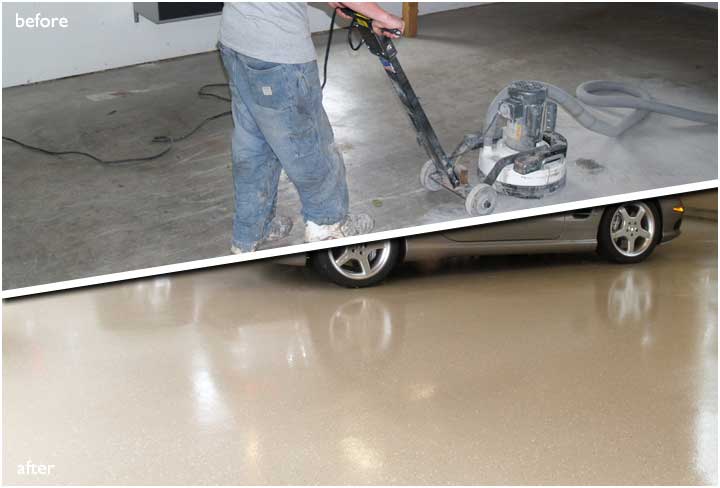Epoxy flooring and bare concrete are both popular flooring choices from the garage to the basement to commercial businesses. But is one really better than the other?
That’s the question that we’re going to look into today! What are the differences that separate these two? Both concrete flooring and epoxy flooring can be great flooring choices for different scenarios.
In the article below, we’ll discuss the differences in these flooring systems and determine the better choice overall! Continue reading to learn more!
Epoxy Flooring
Epoxy flooring is a resinous flooring system made by mixing epoxy resin with a hardener and pouring it over an appropriately prepared surface. This flooring system got its start in industrial facilities but has made its way into homes and businesses ever since!
Pros
- Durability: Epoxy flooring is remarkably durable. This flooring system can withstand various impacts, abrasions, and foot and vehicle traffic without being damaged in the process.
- Resistance: This seamless flooring system is non-porous, meaning that liquid substances, from harsh chemicals to water, cannot permeate its surface. As a result, epoxy flooring is highly resistant to chemicals and water while repelling stains and preventing damage.
- Longevity: Epoxy is a floor that’s built to last! When properly installed and maintained, epoxy flooring can last for 25 years or more!
- Low-maintenance: These floors only require minimal maintenance to keep them beautiful and long-lasting. Not to mention that maintenance is remarkably easy to keep up with!
- Customization: There is a limitless variety of colors, patterns, and textures to choose from when designing an epoxy floor. These floors are completely customizable, from simple, solid-color floors to intricate, multi-colored patterns.
Cons
- Expensive to Replace: If you get tired of your epoxy floor or no longer like the design, they can be quite costly and time-consuming to replace. These floors are hard and meant to last for decades, so tearing one out takes an abundance of time and resources.
- Not DIY-friendly: The installation process for epoxy flooring is not a DIY-friendly project. These floors require close attention to detail and a professional team to install correctly. Even a simple mistake can cause you to scrap the project and need to start over.
- Can be Cold Under Feet: Without an underlying heating system, epoxy floors can be much colder than hardwood or carpeted flooring systems. For some homeowners, this can be an issue.
- May be Slippery in Wet Environments: Epoxy flooring itself is no more slippery than other flooring systems. However, if it’s exposed to spills or wet conditions, it can become slick. This can be remedied through non-skid additives and textured options!
Bare Concrete
Concrete flooring with no type of coating in place is one of the most common flooring choices for spaces such as garages, basements, warehouses, and factories. These floors are rugged and can handle a remarkable amount of wear and tear over the years. Not to mention, concrete is the base for many different flooring options!
Pros
- Durability: Concrete is a strong floor by itself. It can handle various wearing factors, including high volumes of foot and vehicle traffic. Concrete also does well as a load-bearing floor.
- Longevity: Concrete is a long-lasting flooring material, which is why it’s the base for practically every building project imaginable! These floors can last for 20 years or more when properly installed.
- Versatile: Concrete is an excellent choice alone, depending on the situation and environment. However, concrete shines as a substrate for other floors. Concrete can be used as a base for everything from hardwood to epoxy to carpet to much more!
- Slip-resistance: Concrete is typically not smooth when it’s finished, meaning the surface will always have texture. Even polished concrete isn’t perfectly smooth. This gives concrete flooring an inherently non-skid surface!
- Budget-friendly Flooring: Basic concrete is a notably affordable option. These floors can start as low as $2 to $6 per square foot! If you need a floor on a budget, concrete is a great option!
Cons
- Limited Customization: As far as a bare concrete floor goes, customization is limited to stains, stenciling, and scoring techniques. Concrete stains offer various colors and can be used to create patterns when combined with stencils or scoring. However, the customization options are limited compared to epoxy flooring.
- Cracks: All concrete will crack, no exceptions. This flooring material will always crack at some point due to the floor shifting and settling after installation. Saw-cut joints can lessen these cracks but will not prevent them all. These small cracks won’t compromise the floor’s structural integrity, but they’re not pretty!
- Cleaning can be Difficult: Though concrete is a low-maintenance option, the cleaning itself isn’t the easiest. As concrete doesn’t have a smooth surface, sweeping and mopping can be challenging. Dusting is another issue regarding maintenance. These floors regularly produce dust that is surprisingly difficult to keep up with.
- Stains and Water Damage: If concrete sealing isn’t adequately maintained, liquids can easily be absorbed by this porous floor. Concrete is known to soak up moisture and liquids, leading to stains and other liquid-related damage.
Who Wins?
Both of these floors have their own advantages and disadvantages. However, concrete flooring’s cons can all be remedied using epoxy floor. While most of epoxy flooring’s cons are situation-specific or can be fixed with some simple add-ons.
With all of these pros and cons in mind, epoxy flooring’s pros outweigh those of concrete’s, and the cons are less impactful than concrete. So, epoxy flooring is the clear victor in this comparison!

